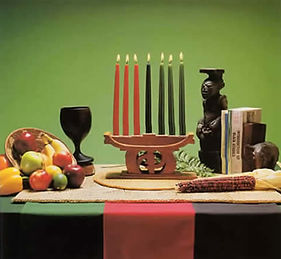The Seven Principles of Kwanzaa
Kwanzaa began in America. The holiday centers around Seven Principles, Nguzo Saba (En-GOO-zoh Sah-BAH), which represent the values of family, community and culture for Africans and people of African descent to live by.
From the East African language of Swahili:
-
Mkeka (em-kay-kah) - a straw place mat representing tradition
-
Muhindi (moo-hin-dee) corn placed on the mkeka to represent each child of the family
-
Mazao (mah-zah-o) fruits and vegetables to remember the earth's abundance
-
Zawadi (Zah-wha-dee) Kwanzaa gifts
-
Kinara (kee-nar-rah) wooden candle holder
-
Karamu (kaa-rah-moo) a glorious feast
-
Umoja (oo-MOE-jah) - Unity - Joining together as a family, community and race
-
-
Kujichagulia (koo-jee-cha-goo-LEE-ah) - Self-determination - Responsibility for one's own future. Learn traditions to help define ourselves.
-
-
Ujima (oo-JEE-mah) - Collective Work and Responsibility - Building the community together and solving any problems as a group. Light a green candle and work together to get a family chore done.
-
Ujamaa (oo-JAH-mah) - Cooperative Economics - The community building and profiting from its own businesses. Light one red candle. Save up coins for one whole year to buy a family gift.
-
-
Nia (nee-AH) - Purpose - The goal of working together to build community and further the African culture. Reflect on how to fill the days and years ahead. Some may dream of life as a musician.
-
-
Kuumba (koo-OOM-bah) - Creativity - Using new ideas to create a more beautiful and successful community. Make up dances to perform for friends. Sculpt clay or recite a favorite poem.
-
-
Imani (ee-MAH-nee) - Faith - Honoring African ancestors, traditions and leaders and celebrating past triumphs over adversity. Believe that good will always happen. A feast fills the room with savory smells of roasted yams and collard greens
.jpg)